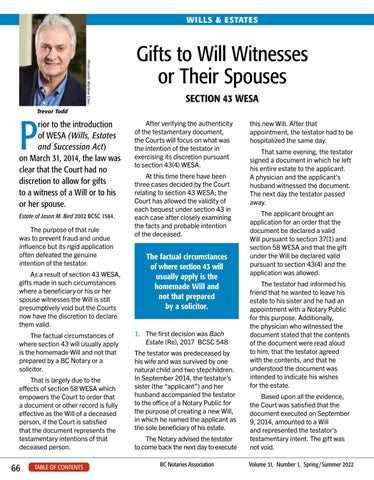WILLS & ESTATES
Photo credit: Matthew Chen
Gifts to Will Witnesses or Their Spouses SECTION 43 WESA
Trevor Todd
P
rior to the introduction of WESA (Wills, Estates and Succession Act) on March 31, 2014, the law was clear that the Court had no discretion to allow for gifts to a witness of a Will or to his or her spouse. Estate of Jason M. Bird 2002 BCSC 1584.
The purpose of that rule was to prevent fraud and undue influence but its rigid application often defeated the genuine intention of the testator. As a result of section 43 WESA, gifts made in such circumstances where a beneficiary or his or her spouse witnesses the Will is still presumptively void but the Courts now have the discretion to declare them valid. The factual circumstances of where section 43 will usually apply is the homemade Will and not that prepared by a BC Notary or a solicitor. That is largely due to the effects of section 58 WESA which empowers the Court to order that a document or other record is fully effective as the Will of a deceased person, if the Court is satisfied that the document represents the testamentary intentions of that deceased person.
66
TABLE OF CONTENTS
After verifying the authenticity of the testamentary document, the Courts will focus on what was the intention of the testator in exercising its discretion pursuant to section 43(4) WESA. At this time there have been three cases decided by the Court relating to section 43 WESA; the Court has allowed the validity of each bequest under section 43 in each case after closely examining the facts and probable intention of the deceased.
The factual circumstances of where section 43 will usually apply is the homemade Will and not that prepared by a solicitor. 1. T he first decision was Bach Estate (Re), 2017 BCSC 548 The testator was predeceased by his wife and was survived by one natural child and two stepchildren. In September 2014, the testator’s sister (the “applicant”) and her husband accompanied the testator to the office of a Notary Public for the purpose of creating a new Will, in which he named the applicant as the sole beneficiary of his estate. The Notary advised the testator to come back the next day to execute BC Notaries Association
this new Will. After that appointment, the testator had to be hospitalized the same day. That same evening, the testator signed a document in which he left his entire estate to the applicant. A physician and the applicant’s husband witnessed the document. The next day the testator passed away. The applicant brought an application for an order that the document be declared a valid Will pursuant to section 37(1) and section 58 WESA and that the gift under the Will be declared valid pursuant to section 43(4) and the application was allowed. The testator had informed his friend that he wanted to leave his estate to his sister and he had an appointment with a Notary Public for this purpose. Additionally, the physician who witnessed the document stated that the contents of the document were read aloud to him, that the testator agreed with the contents, and that he understood the document was intended to indicate his wishes for the estate. Based upon all the evidence, the Court was satisfied that the document executed on September 9, 2014, amounted to a Will and represented the testator’s testamentary intent. The gift was not void. Volume 31, Number 1, Spring /Summer 2022






















